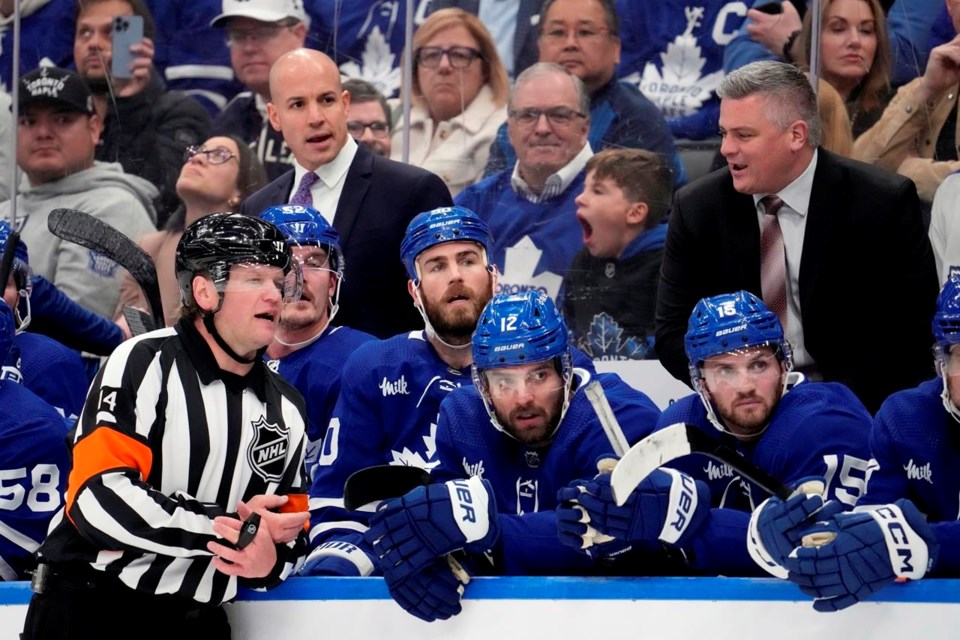Leon Draisaitl has left the rink frustrated by a call more than once.
The Edmonton Oilers star might get an explanation from a referee or linesman on the ice. That doesn't mean Draisaitl is in agreement.
After some time to cool off, however, he might watch replays of the sequence in question — slowed down, from multiple angles.
And then probably watch it again.
"I'm like, 'Man, like, that's so tough to see,'" Draisaitl said at the last month's NHL/NHLPA player media tour outside Las Vegas. "I'm watching it on video again, and it's tough to see on video.
"Can't even imagine what it's like in the moment."
There's little debate NHL officials have one of the toughest jobs in professional sports. The game is fast and decisions have to be made in the blink of an eye.
Video replay and coaches' challenges are there to double check goals and offside — along with some infractions like high-sticking — but so much of hockey still comes down to judgment calls in the heat of the moment.
Other sports across North America have systems in place where officials can be interviewed by reporters after games in the event of a controversial or high-profile decision.
That's not the case in the NHL.
Players and coaches have to face the media on a daily basis. Why not referees and linesmen?
"It'd be a great idea," Draisaitl said. "There's no ref out there that's trying to purposely make the wrong decisions."
Winnipeg Jets defenceman Josh Morrissey, one of the NHL's more eloquent players, also doesn't see a downside.
He understands the challenges of the role, but added clarity would be beneficial for players, coaches, management, fans and media.
"I don't envy their position where the game is happening pretty fast and you have to make a call in a split-second, and now stand in front of the media," he said. "But I don't think it would necessarily be bad for the game and maybe would help just a little more transparency."
As things currently stand, debate will rage on TV, talk radio, podcasts and social media following a contentious call without ever getting all the perspectives.
"It might be a benefit for the refs as well," Edmonton Oilers captain Connor McDavid said of the odd interview. "It's a really, really hard job. They do the best that they can and they oftentimes are right. (But) it would be nice to hear an explanation or two on certain things."
"Good for both sides," Draisaitl added. "For them to explain themselves so we understand, and for them to share their side of what they see."
NHL deputy commissioner Bill Daly made it clear there's no appetite to change the policy on officials talking to reporters.
"Having said that, I don't think we're escaping any responsibility to address the media when controversial judgments or decisions are made," he added.
Daly said himself, commissioner Gary Bettman, senior vice-president and director of hockey operations Colin Campbell, and director of officiating Stephen Walkom are all accountable publicly when needed.
"I think (officials) enjoy their anonymity on the ice to the extent they can," he said. "We feel pretty strongly that (the NHL) should have that voice — not an individual."
Calgary Flames centre Nazem Kadri said it's clear why that's the case.
"The league is protecting them, obviously," he said. "I know how hard of a job it is, how tough it is to see everything in real time."
But in Kadri's eyes, that doesn't mean an explanation of what happened in a particular moment wouldn't be beneficial.
"Your perspective's maybe not always the same as the (referee) across the ice from you," Kadri continued. "If you've got the ability to go look at a replay and then answer some questions on what you're thinking after, I think that's a good idea. You get some clarity instead of having to go through six, seven other people or a whole committee or a union.
"Just go get it right from the horse's mouth."
Chicago Blackhawks defenceman Seth Jones is on the fence about referees speaking post-game.
"If you asked me after a loss with some bad calls … maybe," he said with a grin. "It's tough out there. It's fast. A lot of things happen. They'll probably tell you if you sat down with them, they want some calls back. Everyone makes mistakes. But the two-minute (officials interview) is interesting in the NBA.
"Put the refs on blast a little bit. They don't really seem to mind it."
"Keeps it honest both ways," Montreal Canadiens winger Cole Caufield added. "Hear what they say about it so we can know what they were seeing."
Carolina Hurricanes centre Seth Jarvis said because only captains and alternate captains — three players per team — are allowed to speak with refs in an official capacity on the ice, many players don't get the message directly.
"Would be nice see their perspective because I can't talk to the refs," he said. "It'd be cool to see them interviewed and actually get their point of view."
But Columbus Blue Jackets winger Johnny Gaudreau has advice for any official presented with the option of speaking with reporters.
"Stay out of it all," he joked. "Don't answer anything — just on the bus and go.
"I wouldn't change anything."
This report by The Canadian Press was first published Oct. 10, 2023.
___
Follow @JClipperton_CP on X.
Joshua Clipperton, The Canadian Press



